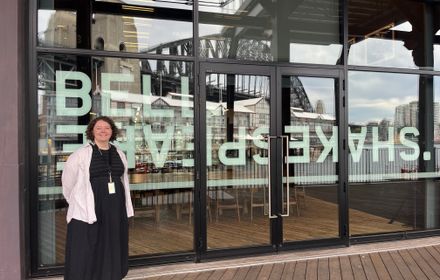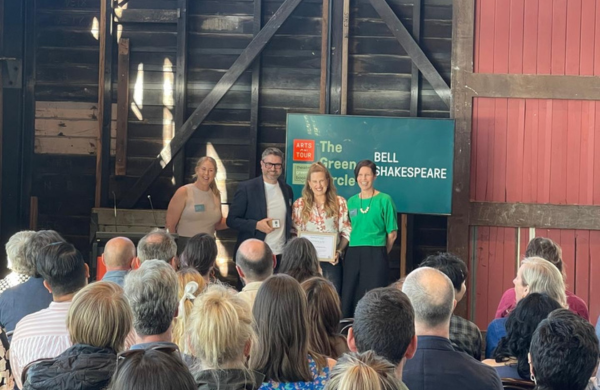
Support
Bell Shakespeare's Oral Histories
13 Nov 2025

Find out how we’re minimising our environmental impact both on and off the stage.

In 2025, Arts on Tour and Theatre Green Book Australia partnered to deliver The Green Circle, a new initiative to support leading theatre and dance organisations to adopt more environmentally sustainable practices.
Henry VI, Part 2 - Act 3, Scene 1
Pollution, changing climates, waste, and environmental decline have rapidly increased as a world concern in recent decades, as a result of global warming. A connection to the natural world, and concern for its health and future, is something Shakespeare also explored. Coriolanus offers glimpses of sudden temperature shifts and failed harvests disrupting the lives of ordinary people. In Richard II, the famed “sceptred isle” is battered by harsh winds, driving rain, and bitter cold – perhaps related to the period known as the Little Ice Age, believed to have swept over England in the 1500s and 1600s. And Shakespeare was far from alone in inviting audiences to attend more deeply to the living landscape.
History has been quietly (and sometimes loudly) urging society to pay attention to the natural world. Take the Romantic poet William Wordsworth, whose vision for preserving the Lake District as “a sort of national property” helped inspire the very idea of national parks including England’s National Trust to the vast US National Park system. Art has always been intertwined with ecology, and theatre, being imaginative, communal, and oratorical, is uniquely positioned to spark big conversations.
All of this is to say that environmental responsibility is not new to us at Bell Shakespeare. We’ve long understood that reducing our environmental footprint, onstage and behind the scenes, should be part of our philosophy as a modern theatre company.
In 2025, that commitment became official when the sustainability committee pledged to align our practices with the Theatre Green Book, marking a turning point in how we hold ourselves accountable and understand our role within the broader arts ecosystem.
The Theatre Green Book began as a practical response in 2021 to the growing global call for unified climate action in the performing arts. Created by writer Paddy Dillon and a collective of UK theatre-makers, it now exists in over 17 versions and is being used in more than 50 countries.
Australia’s adaptation, the Theatre Green Book Australia, first published in 2023 by Grace Nye-Butler and Chris Mercer, reframed the framework for our cultural and environmental context. The newly released second edition builds on that foundation, developed with First Nations performing arts practitioners and a wide range of local voices to ensure the guide reflects the stories, lands, and communities it represents.
Bell Shakespeare joined this collaboration in 2025 when Company Manager Danielle Ironside and Production Manager Slade Blanch participated in the first Australian Green Circle. A handful of theatre practitioners came together in this inaugural group to share challenges, brainstorm solutions, and test practical tools for more sustainable theatre-making. As Dani puts it:
One milestone we’re especially proud of is achieving a formal accreditation within the Theatre Green Book standards, alongside our colleagues at Bangarra Dance Theatre, Belvoir St Theatre, Sydney Dance, Monkey Baa Theatre Company, and Performing Lines. It's been a long, shared process and we're so very proud to be a part of it.
The goal isn't to restrict creativity, but to understand the true cost of our materials, processes, and travel, and to make choices that are both smart and sustainable.
One of the first changes we made was reducing the number of props used in productions and prioritising durable pieces that can be reused rather than rebuilt, especially for our travelling ensemble of actors, The Players. We also developed clearer end-of-life plans for sets and costumes, working with groups like the Men’s Shed to rehome or recycle materials, bringing our commitment to sustainability beyond our rehearsal rooms and into the wider community.
As touring is one of the biggest contributors to emissions in the performing arts, this also became a natural area for more substantial change. For the first time, the Henry 5 tour completed every short leg by coach instead of plane, something that every single cast member, crew and creative collectively agreed to. Our national tour of Romeo & Juliet went even further, by designing the schedule around coach travel. We cut emissions by more than 50%. Taken together, 2025 saw the lowest number of flights across staff, cast, crew, and creatives in our company’s history.
These changes are still evolving, but they’re slowly becoming part of our applied philosophy. The aim isn’t just to follow guidelines, it’s to contribute to a broader cultural shift that shows sustainability and creativity aren’t opposing forces but can in fact be complimentary and fruitful to one another.
Theatre has always shaped the way we see the world. Now it’s helping to protect the world we depend on.
Please get in touch with the Bell Shakespeare team if you want to hear more about our commitment to sustainability.
